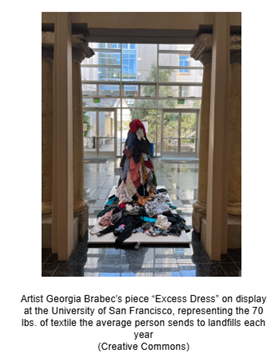
In a world where trends change overnight, fast fashion has become the go-to for many people seeking the latest looks without breaking the bank. But, as the demand for affordable, stylish clothing grows, so do the environmental and ethical concerns. The term “fast fashion” is used when retailers make cheap and fashionable clothing that quickly satisfies the needs of young customers. Companies such as Forever 21, Shein, H&M, and others copy the latest trends and immediately pump them into stores and online websites. It involves rapid design, production, distribution, and marketing. This speedy process allows retailers to have variety in what they sell, which is why it appeals to so many young consumers.
In theory, this new and upcoming industry sounds amazing. It offers affordable and accessible clothing, which is rare to find nowadays. Also, since the clothing has so much variety, people can experiment with their style and try different things. It lets consumers get the clothes they want- when they want. Isabella Onfrillo, a student at Pennridge High School, gave insight into fast fashion. “When I’m out shopping and see something I like, I usually don’t buy it because I know I could get the same thing for cheaper on a site like Shein,” she said.
The majority of fast fashion shoppers are students. A report from ThredUP shows that 72% of college students shop fast fashion. When asked about this statistic, Rachael Hass, a student at the University of Pittsburgh, was not surprised at all. “College students will do anything to save money,” she said.
Although it sounds like a great way to save, there is a dark side to fast fashion- one of them being the environment. According to the United Nations Environment Programme, the fast fashion industry is one of the world’s biggest consumers of water. It requires 700 gallons of water to produce just one cotton shirt. That is enough water for a person to drink for 2.5 years. Now, imagine the massive amounts of water that companies like Shein or H&M use as they produce thousands of garments each day.
Water isn’t the only environmental concern. According to an analysis done by Business Insider, the industry is responsible for about 10% of the carbon emissions in our atmosphere. Also, this industry produces obscene amounts of waste. A documentary called “The True Cost” says that 85% of textiles go to dumps each year. Most fast fashion pieces are worn once and then thrown away. This discarded clothing made of non-biodegradable fabrics can sit in landfills for up to 200 years.
Another concern of fast fashion is the social component. Since fast fashion companies are centered around their rapid production, they put profits before human welfare and often cut ethical corners. A 2018 US Department of Labor report found evidence of forced child labor in factories in Argentina, Bangladesh, China, India, Philippines, and others. The report also discovered that these workers were paid as little as $96 a month and were working 16 hours a day, seven days a week. The conditions of these factories add a whole other layer to this, as workers are exposed to thousands of synthetic chemicals that are linked to cancer.
With that said, there are alternatives to fast fashion. After learning about the dark side of fast fashion, college student Rachael Hass has begun to eliminate it from her wardrobe. “I recently have gotten into thrifting,” she said. “It’s just as cheap as fast fashion, and way better for the environment,” she noted. Thrifting is an incredible alternative, as it is a way to avoid the ethical and environmental concerns that come along with fast fashion. Thrifting also offers amazing sustainability, unique and vintage pieces, and cost-effective items. So, while fast fashion provides convenience and affordability, the detrimental impact on the environment and ethics outweighs the positives- forcing consumers to look into other options.
Sources:
https://earth.org/fast-fashions-detrimental-effect-on-the-environment/
https://www.wri.org/insights/numbers-economic-social-and-environmental-impacts-fast-fashion
https://time.com/6247732/shein-climate-change-labor-fashion/
https://scw-mag.com/news/shein-faces-allegations-of-child-labor/
https://truecostmovie.com/learn-more/environmental-impact/
https://unfccc.int/news/fashion-industry-un-pursue-climate-action-for-sustainable-development




